Audi Q2 vs Hyundai Kona – Which one offers the better deal?
Both models have their strengths – but which one suits you more?
Compare performance, efficiency, price and space directly: Audi Q2 or Hyundai Kona?
Costs and Efficiency:
Price and efficiency are key factors when choosing a car – and this is often where the real differences emerge.
Hyundai Kona has a barely noticeable advantage in terms of price – it starts at 23100 £, while the Audi Q2 costs 24900 £. That’s a price difference of around 1800 £.
Fuel consumption also shows a difference: Hyundai Kona manages with 4.60 L and is therefore minimal more efficient than the Audi Q2 with 4.80 L. The difference is about 0.20 L per 100 km.
Engine and Performance:
Power, torque and acceleration say a lot about how a car feels on the road. This is where you see which model delivers more driving dynamics.
When it comes to engine power, the Audi Q2 has a evident edge – offering 300 HP compared to 218 HP. That’s roughly 82 HP more horsepower.
In acceleration from 0 to 100 km/h, the Audi Q2 is decisively quicker – completing the sprint in 4.90 s, while the Hyundai Kona takes 7.80 s. That’s about 2.90 s faster.
In terms of top speed, the Audi Q2 performs slightly better – reaching 250 km/h, while the Hyundai Kona tops out at 210 km/h. The difference is around 40 km/h.
There’s also a difference in torque: Audi Q2 pulls noticeable stronger with 400 Nm compared to 265 Nm. That’s about 135 Nm difference.
Space and Everyday Use:
Cabin size, boot volume and payload all play a role in everyday practicality. Here, comfort and flexibility make the difference.
Both vehicles offer seating for 5 people.
In curb weight, Audi Q2 is slight lighter – 1330 kg compared to 1370 kg. The difference is around 40 kg.
In terms of boot space, the Hyundai Kona offers a bit more room – 466 L compared to 405 L. That’s a difference of about 61 L.
In maximum load capacity, the Hyundai Kona performs slightly better – up to 1300 L, which is about 250 L more than the Audi Q2.
When it comes to payload, Audi Q2 slight takes the win – 510 kg compared to 490 kg. That’s a difference of about 20 kg.
Who wins the race?
The Audi Q2 proves to be dominates this comparison and therefore becomes our DriveDuel Champion!
Audi Q2 is the better all-rounder in this comparison.
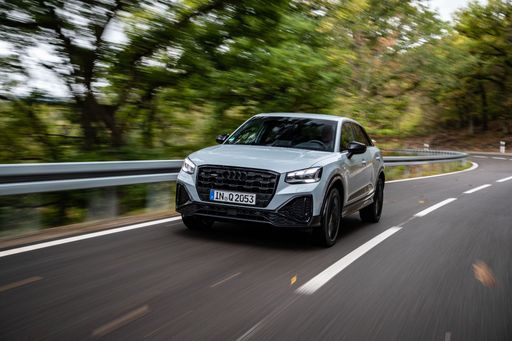 @ Audi AG
@ Audi AG
Audi Q2
Audi Q2
The Audi Q2 packs Audi’s premium attitude into a compact, cheeky package that turns city streets into a runway for tasteful design and clever practicality. It’s an easy car to live with thanks to an upscale cabin, composed manners and sprightly handling, and while it won’t satisfy someone chasing sports-car thrills, it’s a smart, stylish pick for buyers who want substance with a wink.
details @ Audi AG
@ Audi AG
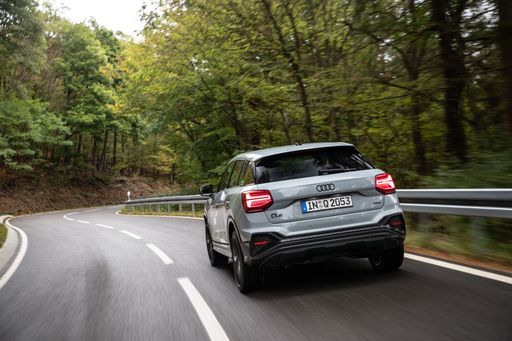 @ Audi AG
@ Audi AG
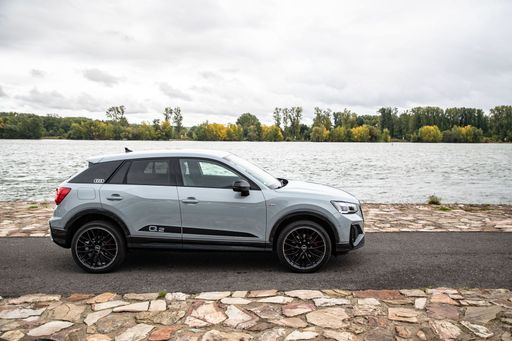 @ Audi AG
@ Audi AG
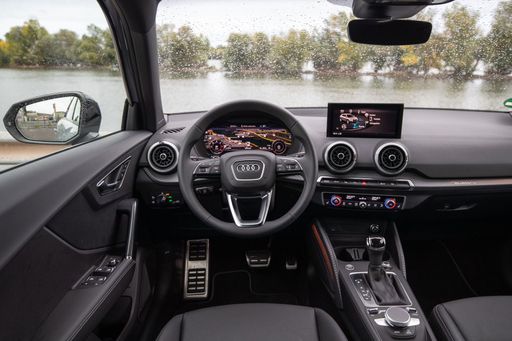 @ Audi AG
@ Audi AG
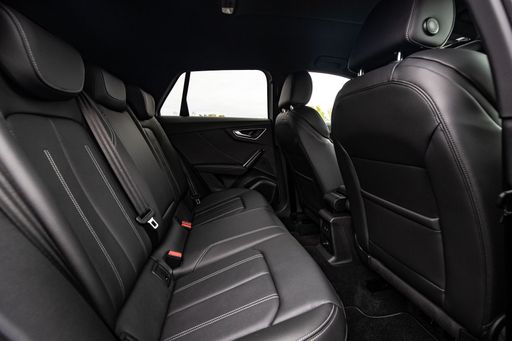 @ Audi AG
@ Audi AG
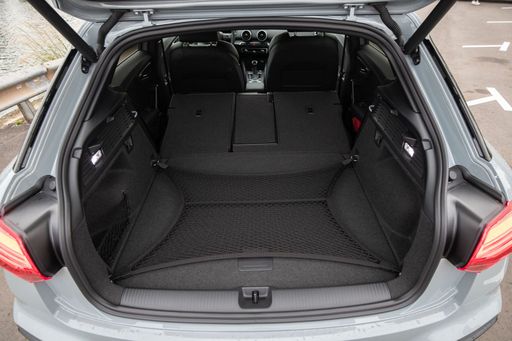 @ Audi AG
@ Audi AG
Hyundai Kona
The Hyundai Kona wears its personality on the outside with bold styling and sprightly handling that turns city driving into something a little more fun than a commute. It blends practical space, modern tech and sensible running costs into a compact, stylish package — a smart pick if you want flair without paying luxury prices.
details @ Hyundai Motor Company
@ Hyundai Motor Company
 @ Hyundai Motor Company
@ Hyundai Motor Company
 @ Hyundai Motor Company
@ Hyundai Motor Company
 @ Hyundai Motor Company
@ Hyundai Motor Company
 @ Audi AG
@ Audi AG
|
 @ Hyundai Motor Company
@ Hyundai Motor Company
|
|
|
|
Costs and Consumption |
|
|---|---|
|
Price
24900 - 43600 £
|
Price
23100 - 41600 £
|
|
Consumption L/100km
4.8 - 8.1 L
|
Consumption L/100km
4.6 - 7 L
|
|
Consumption kWh/100km
-
|
Consumption kWh/100km
14.6 - 16.8 kWh
|
|
Electric Range
-
|
Electric Range
377 - 514 km
|
|
Battery Capacity
-
|
Battery Capacity
1.3 - 65.4 kWh
|
|
co2
127 - 183 g/km
|
co2
0 - 163 g/km
|
|
Fuel tank capacity
50 - 55 L
|
Fuel tank capacity
38 - 47 L
|
Dimensions and Body |
|
|---|---|
|
Body Type
SUV
|
Body Type
SUV
|
|
Seats
5
|
Seats
5
|
|
Doors
5
|
Doors
5
|
|
Curb weight
1330 - 1610 kg
|
Curb weight
1370 - 1773 kg
|
|
Trunk capacity
355 - 405 L
|
Trunk capacity
466 L
|
|
Length
4208 - 4216 mm
|
Length
4350 - 4385 mm
|
|
Width
1794 - 1802 mm
|
Width
1825 mm
|
|
Height
1495 - 1508 mm
|
Height
1580 - 1585 mm
|
|
Max trunk capacity
1000 - 1050 L
|
Max trunk capacity
1300 L
|
|
Payload
450 - 510 kg
|
Payload
420 - 490 kg
|
Engine and Performance |
|
|---|---|
|
Engine Type
Petrol, Diesel
|
Engine Type
Electric, Petrol, Full Hybrid
|
|
Transmission
Manuel, Automatic
|
Transmission
Automatic, Manuel
|
|
Transmission Detail
Manual Gearbox, Dual-Clutch Automatic
|
Transmission Detail
Reduction Gearbox, Manual Gearbox, Dual-Clutch Automatic
|
|
Drive Type
Front-Wheel Drive, All-Wheel Drive
|
Drive Type
Front-Wheel Drive, All-Wheel Drive
|
|
Power HP
116 - 300 HP
|
Power HP
115 - 218 HP
|
|
Acceleration 0-100km/h
4.9 - 10.5 s
|
Acceleration 0-100km/h
7.8 - 11.9 s
|
|
Max Speed
197 - 250 km/h
|
Max Speed
162 - 210 km/h
|
|
Torque
200 - 400 Nm
|
Torque
200 - 265 Nm
|
|
Number of Cylinders
3 - 4
|
Number of Cylinders
3 - 4
|
|
Power kW
85 - 221 kW
|
Power kW
85 - 160 kW
|
|
Engine capacity
999 - 1984 cm3
|
Engine capacity
998 - 1598 cm3
|
General |
|
|---|---|
|
Model Year
2025
|
Model Year
2024 - 2025
|
|
CO2 Efficiency Class
D, F, E, G
|
CO2 Efficiency Class
A, D, C, E, F
|
|
Brand
Audi
|
Brand
Hyundai
|
What drivetrain options does the Audi Q2 have?
The Audi Q2 is offered with Front-Wheel Drive or All-Wheel Drive.
The prices and data displayed are estimates based on German list prices and may vary by country. This information is not legally binding.
